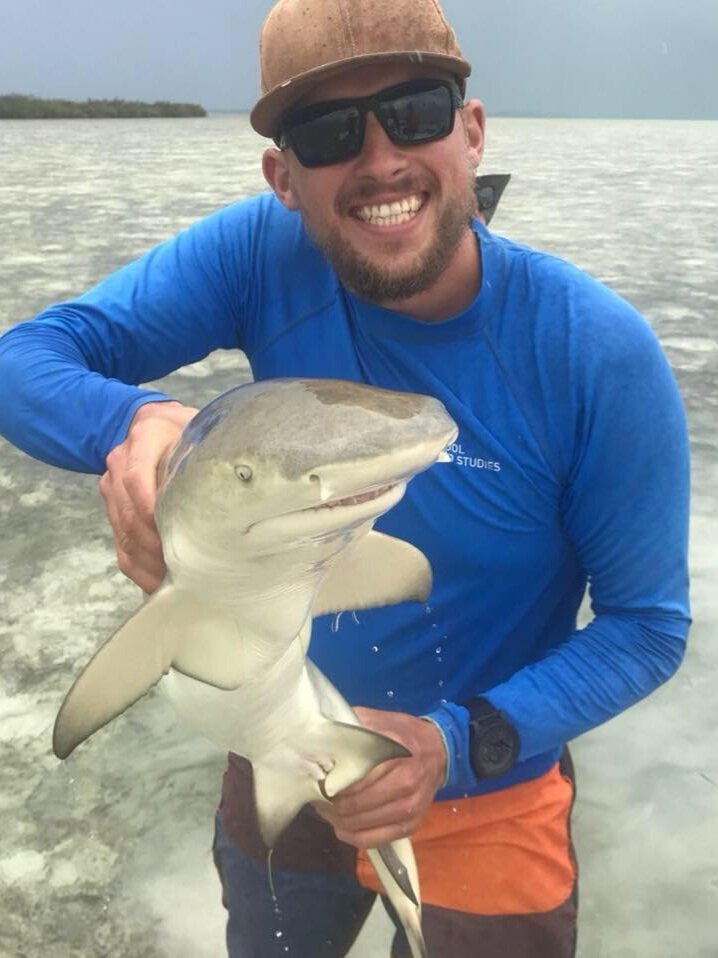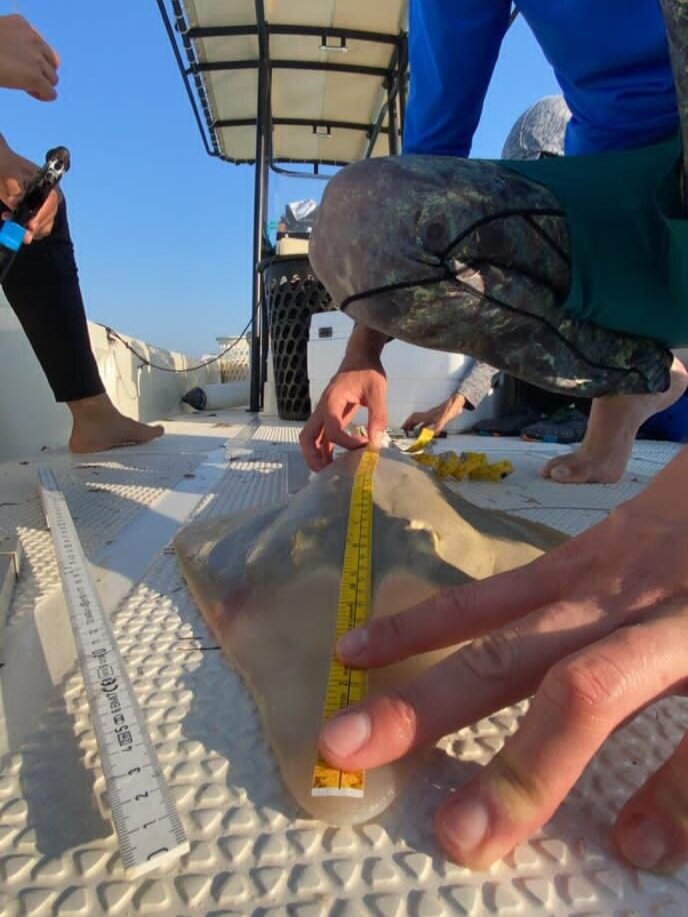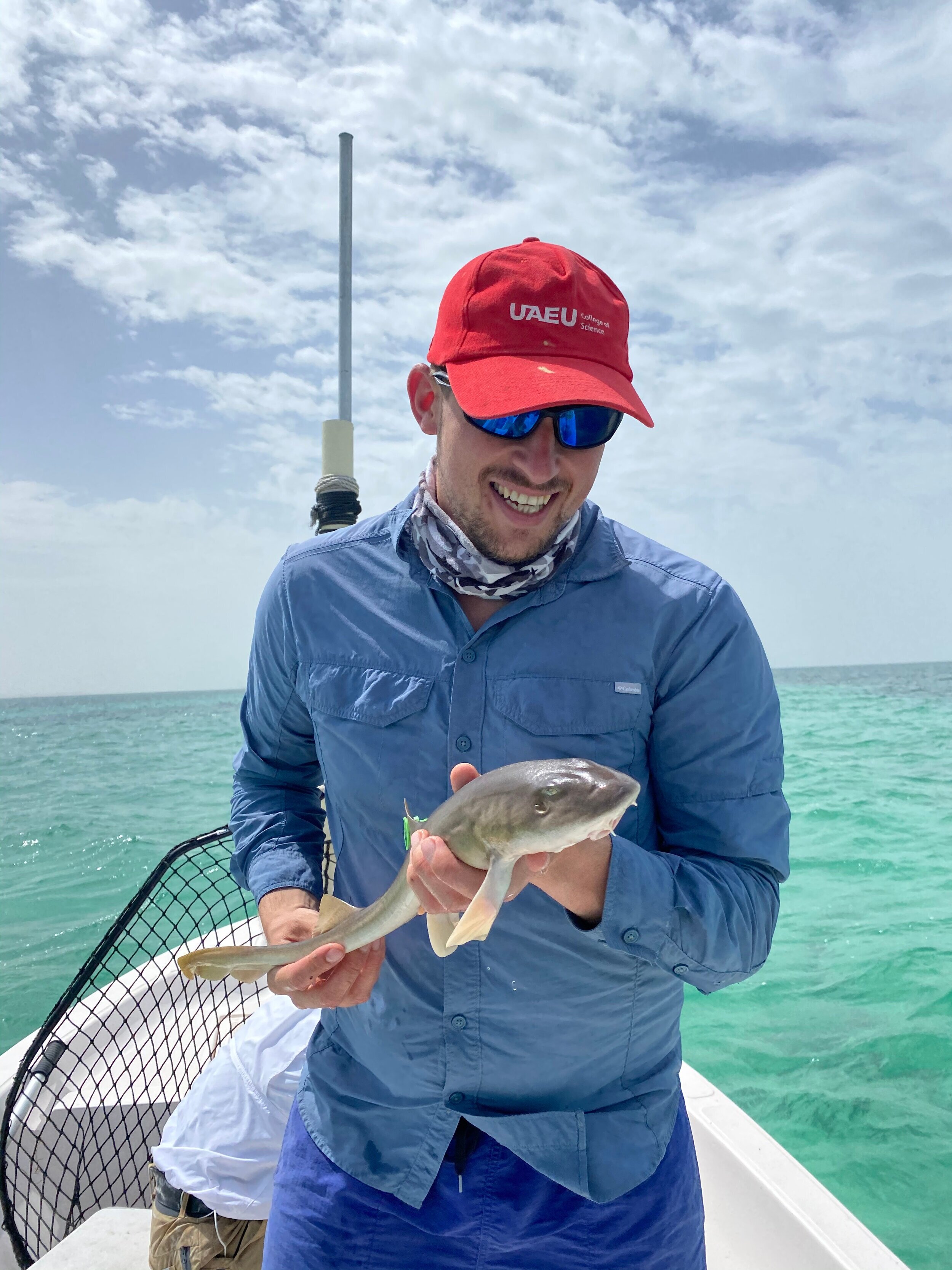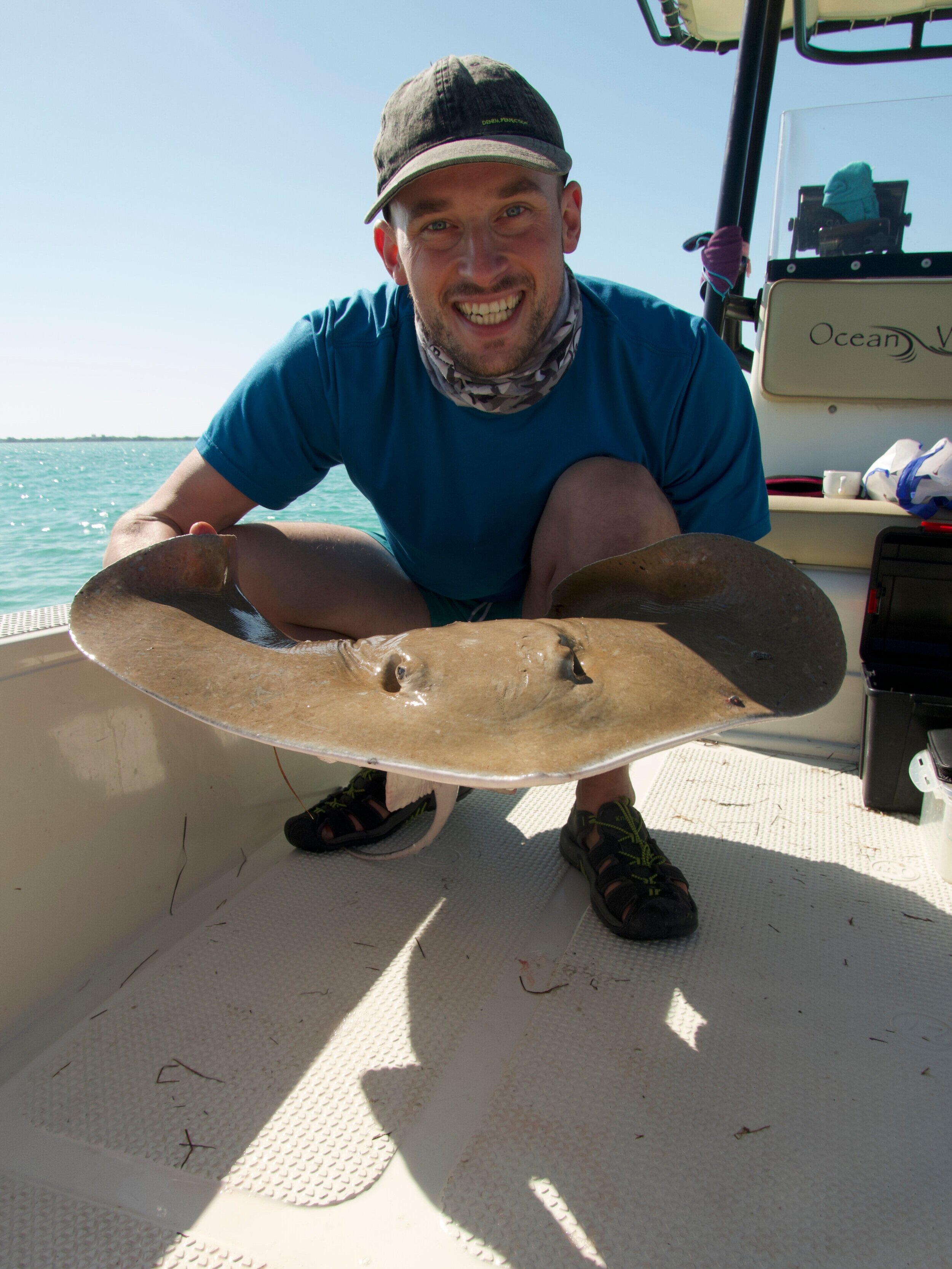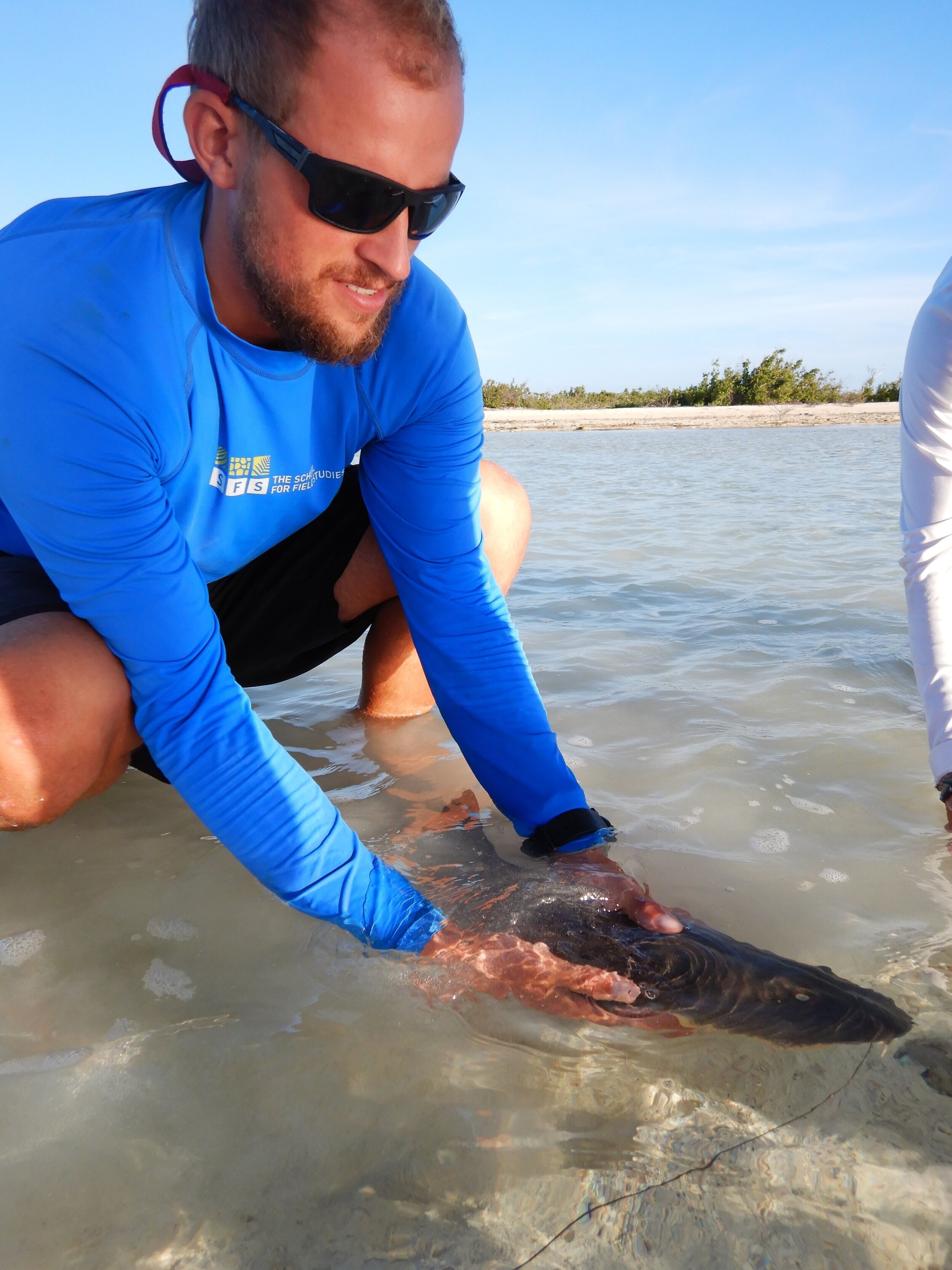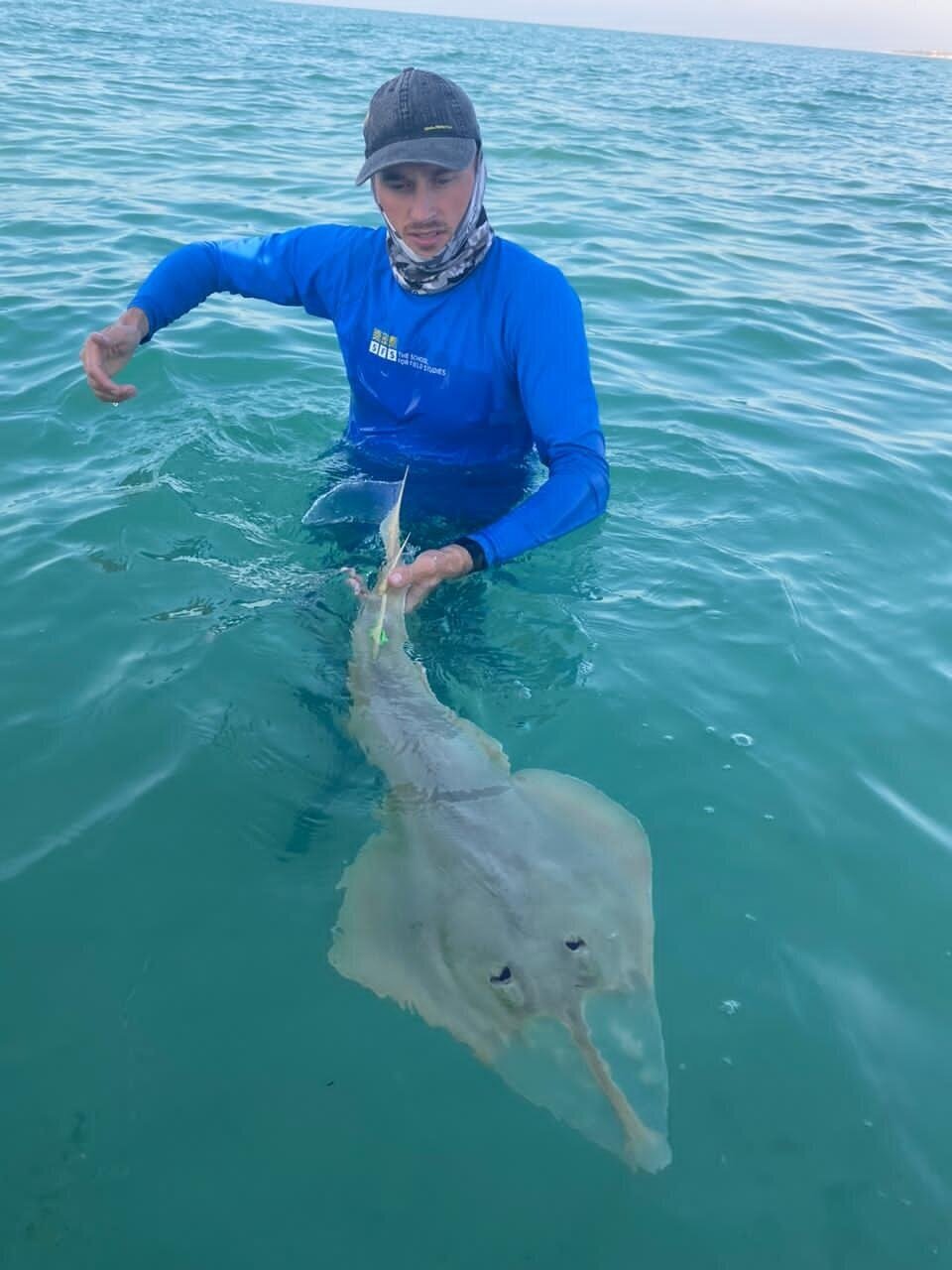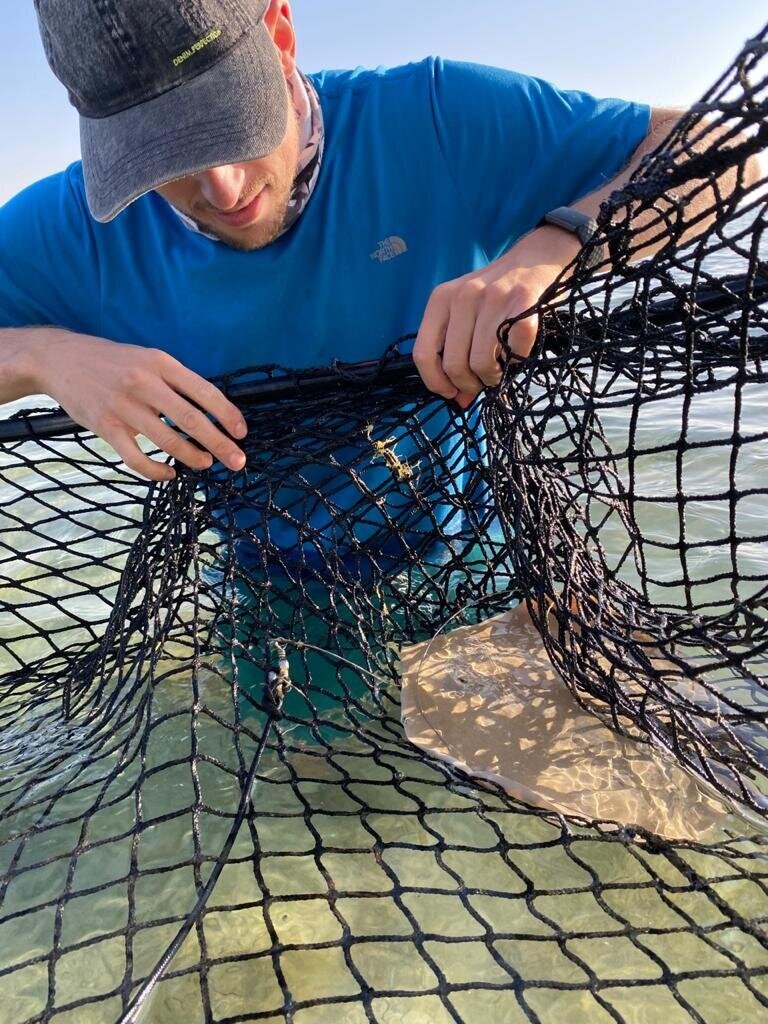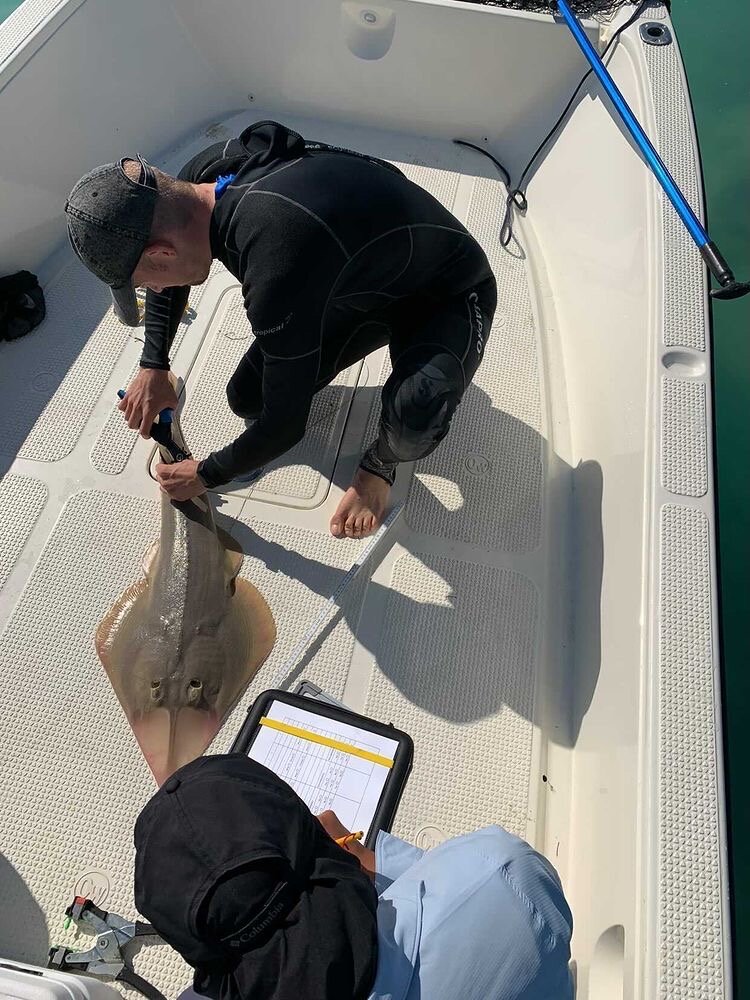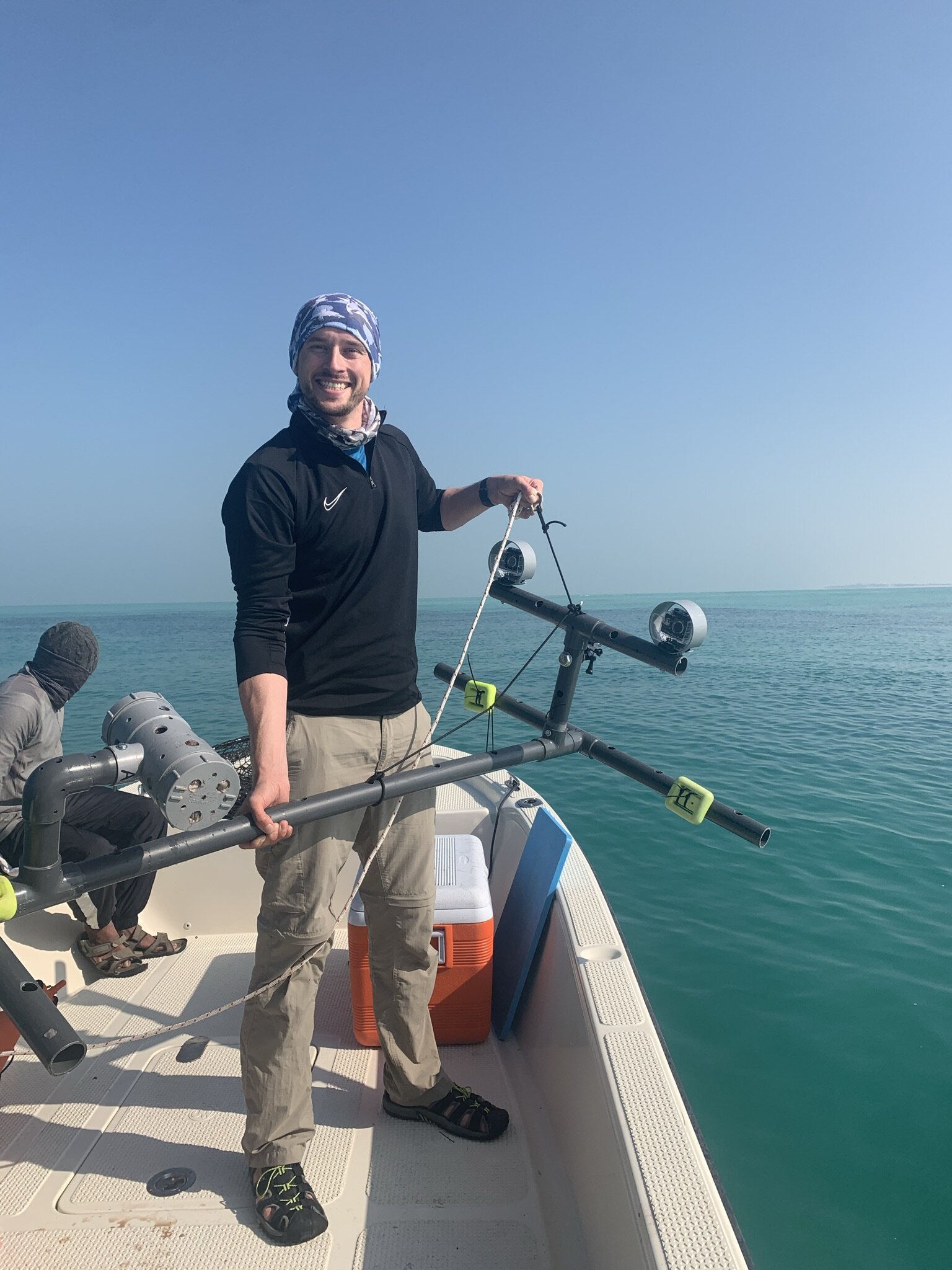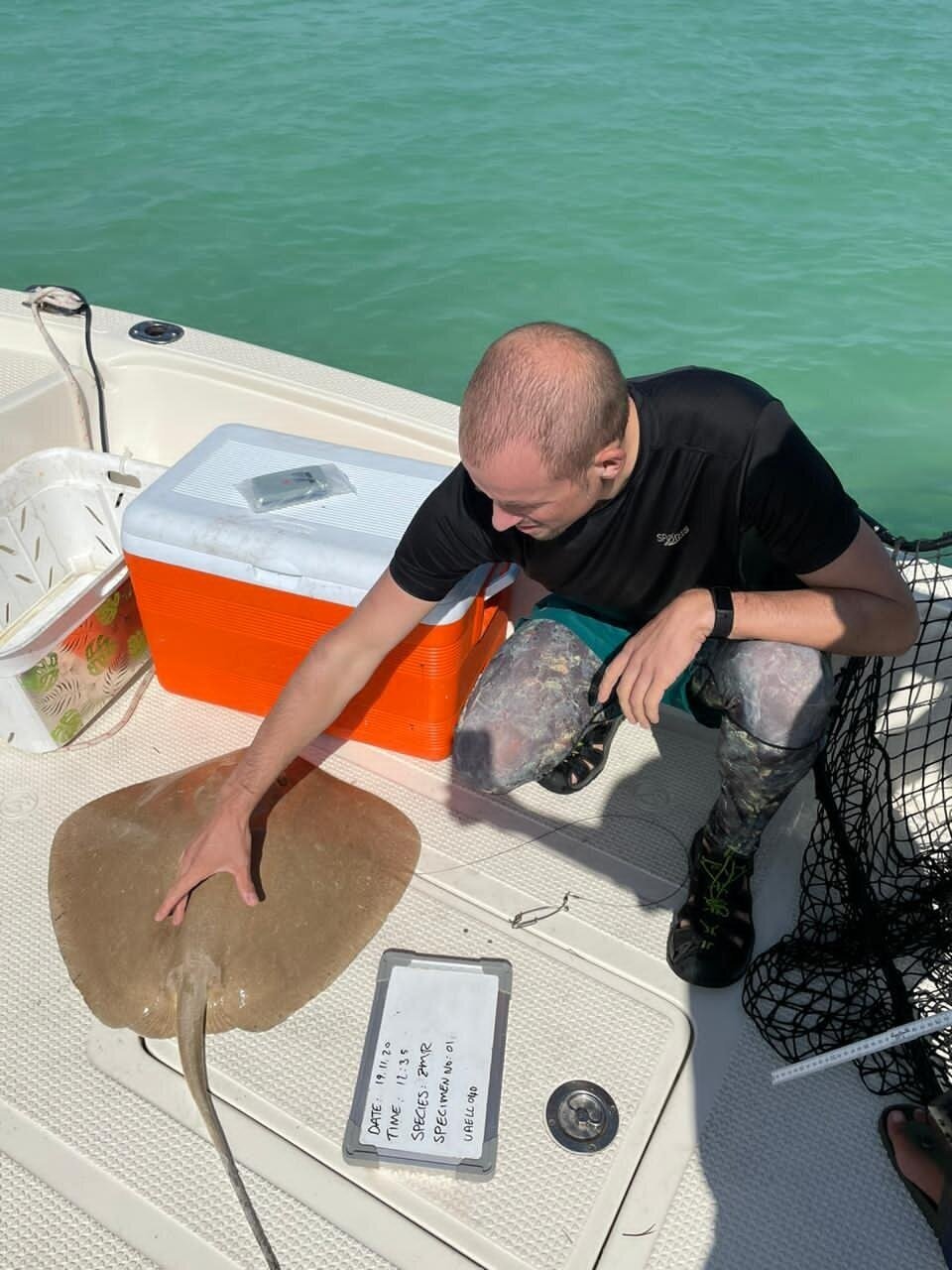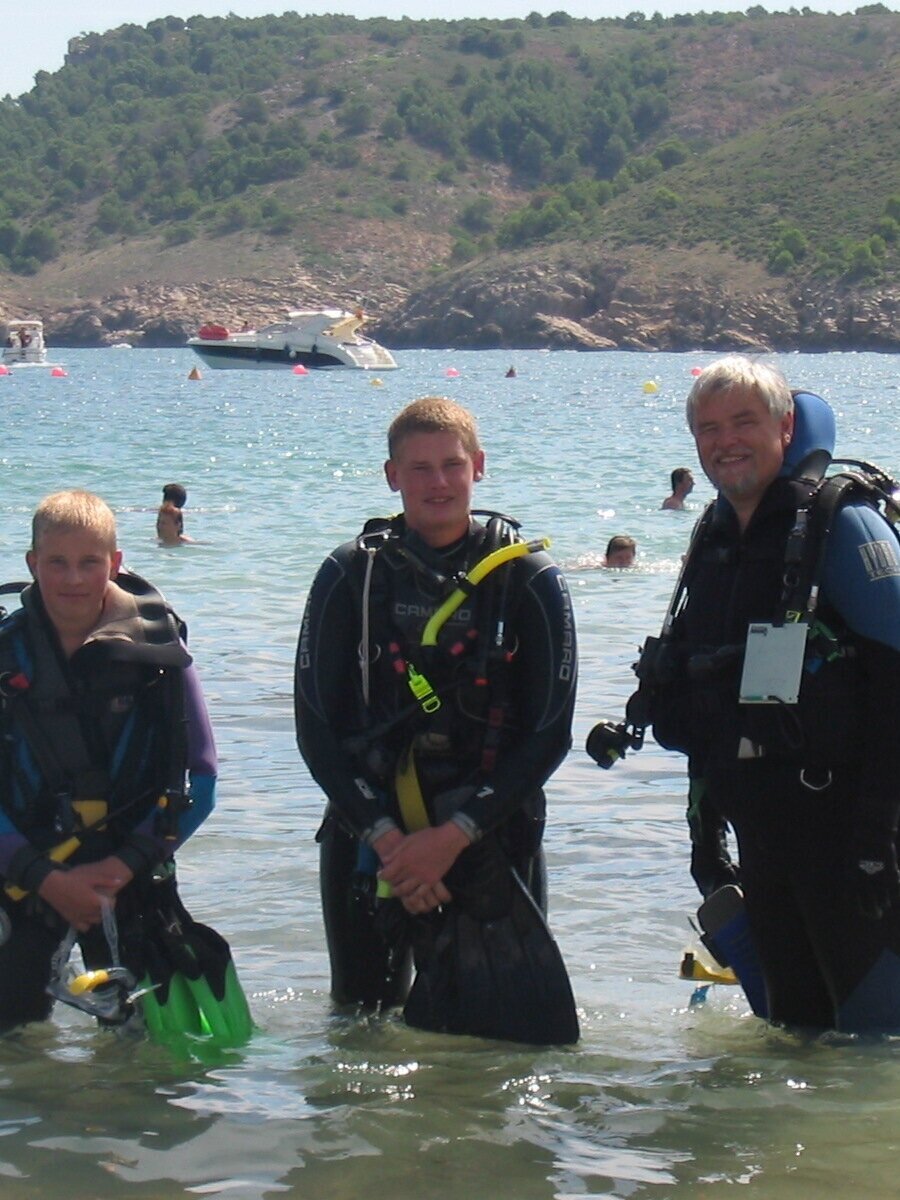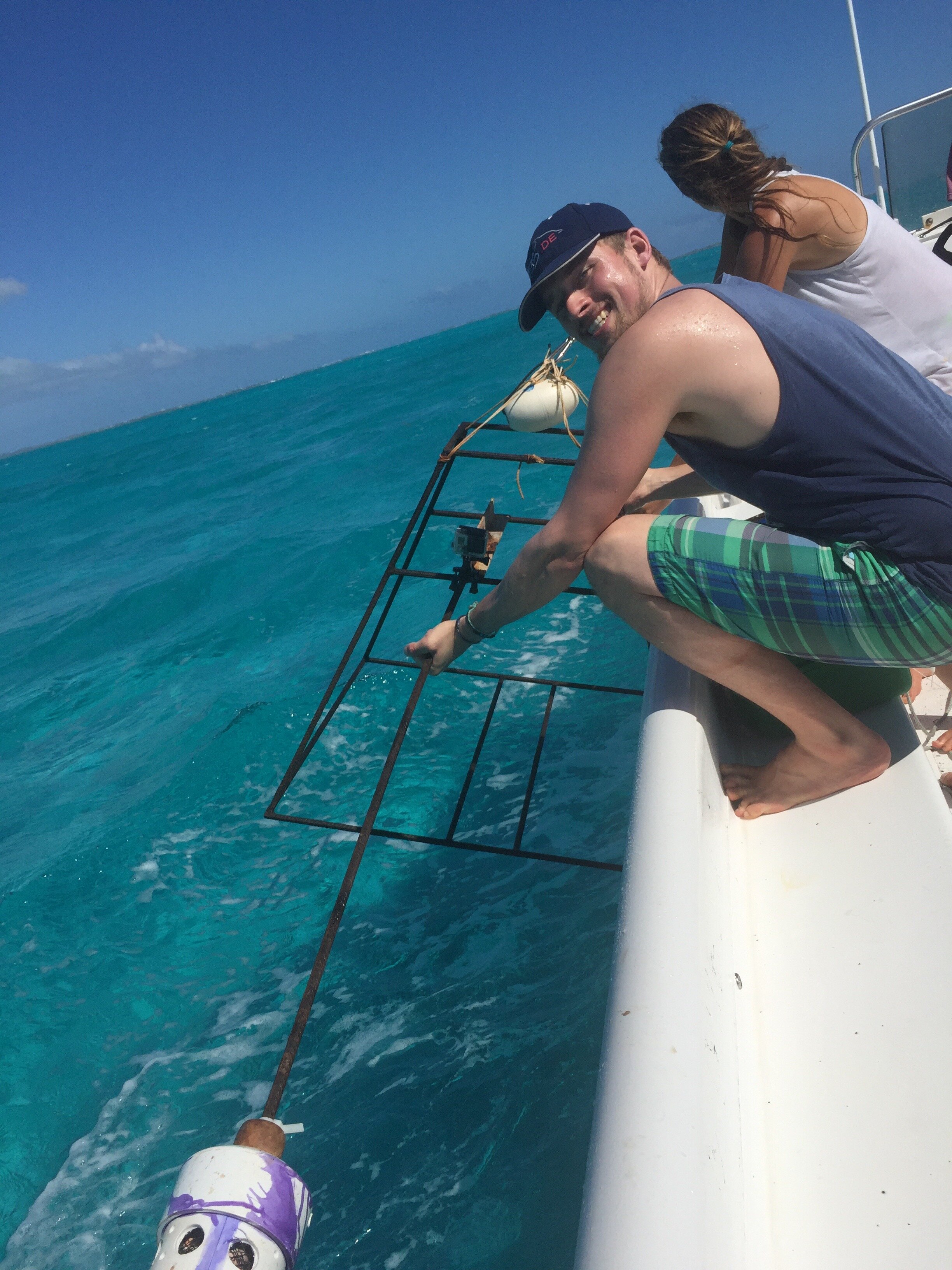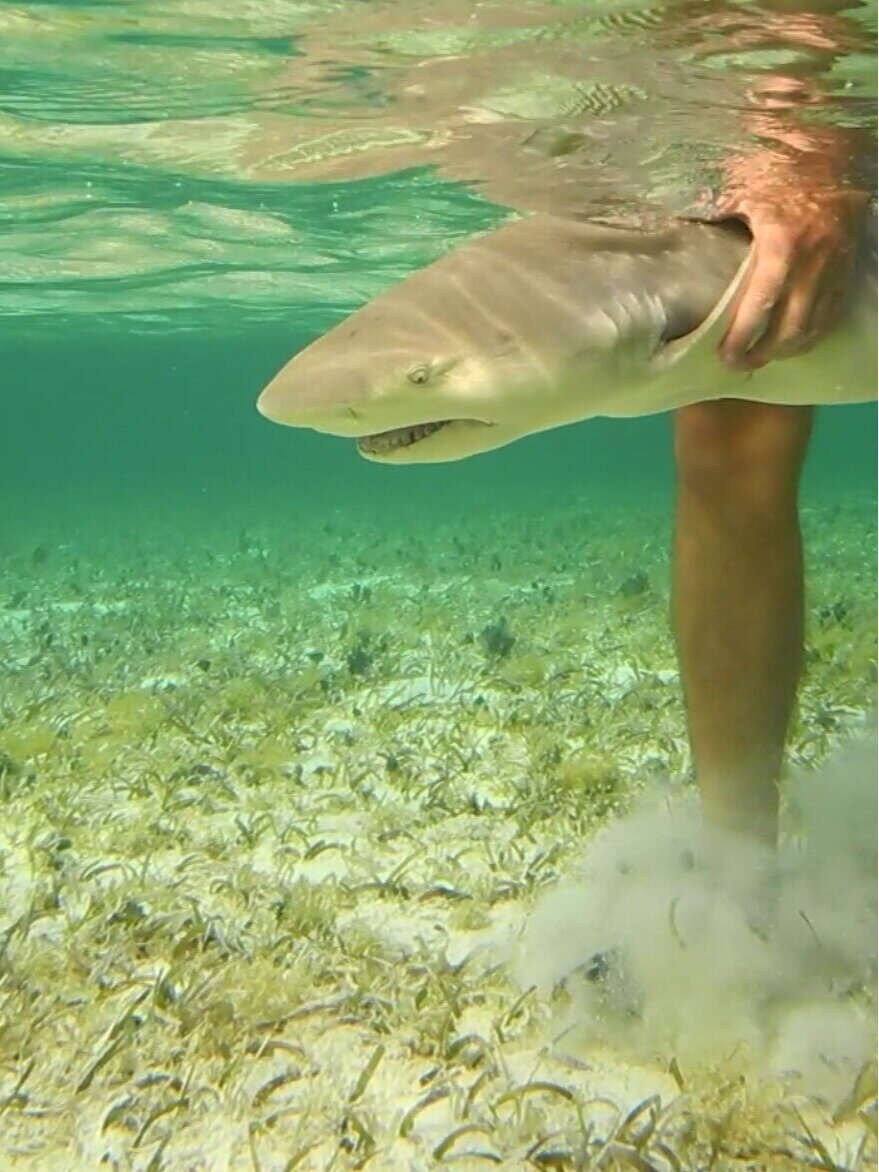Stephan Bruns: PhD student and elasmobranch scientist
Tell us about yourself. How did you begin scuba diving and studying the ocean?
My name is Stephan Bruns, and I was born and raised in Germany. I grew up on the countryside and animals were always part of my life, however, countryside in Germany normally means not much marine life. I learned to scuba dive at age 12 in green, freezing lakes with only a few meters of visibility. I was lucky that my dad had a passion for saltwater aquaria which he passed on to me. My parents told me when I was crying as a toddler, they just sat me in the cradle in front of the aquarium and I immediately stopped crying to watch all the fish. It was relatively early in life that I knew what I wanted to study the marine world. Since the ocean was not regularly accessible, I brought the ocean to me through starting my own sea water aquarium. During my last high school year, I started to breed seahorses and little clownfish. It might not have been the best timing since the aquarium required a lot of work, and my priorities back then were not on my school grades (“as they probably should have been”). It was hard to focus on studying with baby Nemo fish right next to my desk! But I made it, at least this far. Even when my grades were not the greatest, I was always determined to learn. I have grown up with passion for the ocean, first knowing the Mediterranean Sea, and now my focus lies more within tropical waters.
During my undergraduate, I studied abroad in Norway which sparked my love for travel and adventure. This inspired me to pursue a degree with the International Master of Science in Marine Biological Resources (IMBRSea previously known as EMBC+) where I was able to live and study in different countries in Europe. There, I found my study species, which are elasmobranchs (sharks, rays, and skates). I studied video observations of their habitat use and preference in the Turks and Caicos Islands (TCI). Working from Galway, Ireland, I only had the chance to visit TCI for two weeks of data collection and it was fascinating! Right after I finished my Masters, I returned to TCI to work with undergraduate students studying marine science. I led scuba dives and assisted with teaching marine science as a Waterfront Assistant and fell in love with the beautiful and relatively untouched nature.
I would say I am a really optimistic and enthusiastic person. When I am not studying, my favourite hobbies and activities involve outdoor adventures like hiking, diving, snorkeling, sailing, or road trips, and travelling anywhere to experience new countries and cultures. I love playing volleyball, basketball, and badminton; however, I also enjoy a good board game once in a while.
Can you share more about your work?
Currently I’m doing my PhD in Abu Dhabi, United Arab Emirates (UAE) and working as a research assistant. My research will focus on species diversity, relative abundance, habitat preference and seasonal changes in one of the big nature reserves in Abu Dhabi. Additionally, I will link the observation data with water quality, to see if we can detect any seasonal changes. For example, the shallow inshore habitats are getting very hot in the summer and cold in the winter, making it a very harsh environment for corals, but we don´t know yet how sharks or rays deal with these changes in temperature or dissolved oxygen. The water temperature in one of our study areas ranges from 17 °C (62 °F) in the winter up to 36 °C (97 °F) in the summer. In the UAE we could find a great diversity and abundance of sharks, but struggles with a proper management lead to overexploitation of their wild populations. The problem is that there are no baseline data to establish regulations on. Nowadays, more effort focuses on conservation and the protection of those majestic creatures. My favourite local species is the guitarfish, such a beautiful funny looking fellow! I receive a lot of support and guidance from the Environmental Agency of Abu Dhabi which is more than useful since there is little historical data available.
My study will investigate efficacy of such reserves and see if they actually benefit the sharks. I am still in the planning phase of my research, but I did my first gear testing last week. During my Masters I used baited remote underwater video stations (BRUVS) to see diversity and relative abundance of elasmobranchs on South Caicos, Turks and Caicos Islands. The project was part of the Global FinPrint initiative and I am really excited by the method because it is not invasive, lethal, or biased. We deployed BRUVS in the environment and analysed the video footage later on in the office. For my current research I use Stereo-BRUVS, which will allow me to make size analysis, so I will be able to see the age class and species that are using the habitat during different times of the year. Sharks are so important and I am so happy that I have the chance to work towards proper management and conservation of those species which inhabiting our Oceans for millions of years.
Stephan still enjoys spending hours underwater, documenting life!
How did you become interested in marine science?
It all started with my father’s saltwater aquarium and the documentaries I watched when I was young. I was really fascinated by the completely different underwater world, where we are able to be guests for only a short time. The ocean has always felt like a home to me, somewhere I felt calm and rewarded by. My earliest memory of marine biology is from a trip to Costa Brava, Spain. I snorkeled for hours in the sea, observing everything. I was especially fascinated by octopus then. After a while, my parents had to come get me out of the water when my fingers turned blue… I just didn’t want to leave! I cannot think of a time where I did not want to study the ocean. Of course, there are times I have questioned my ability to succeed in this career, and sometimes those moments are still there, but I think that’s part of normal life. The hard work really pays off, and I wouldn’t change what I am doing for any other career.
What do you wish everyone knew about the ocean?
Sharks are so misunderstood, and fortunately that has become a common remark. I wouldn’t encourage someone to cuddle a shark, because they are still wild animals that need respect, but statistically speaking, you’re more likely to be killed by a falling coconut on a nice white tropical beach than by a shark. So be aware of the coconuts! Other than that, I think the most stunning fact regards sharks’ jaws. Sharks have plenty of teeth with multiple rows and they continuously shed them. Some species shed around 35,000 teeth in a life time!
What do you hope to accomplish or learn through your work?
Conservation of endangered species and a healthy ocean. As top predators, sharks and rays are essential to eat the weak and sick animals, so by promoting shark populations in the long run we are promoting a healthier ecosystem on a global scale. Also, this means when you go on a scuba diving holiday, you are more likely to see sharks on your dives! Of course, my study is just one of many, but I hope it will help to assess and enhance shark conservation on a local scale at least. Sharks are so magnificent, when you see them wild in the ocean they are so elegant. I could stay for ours and just observe them, and I hope others can appreciate them in a similar way.
Applying a satellite tag on a male guitar shark.
Please share a favorite memory from your work!
My favourite memory is from a day in the field on South Caicos. The season was almost finished but we still had a couple of acoustic tags to deploy. It was our last day of fieldwork for the summer and, sadly, our catches the weeks before were very low. We still needed to get 5 acoustic tags out at this time. To give you a better understanding, back in South Caicos we used drumlines for catch and release studies of sharks in the different habitats surrounding the small island. Normally, we would identify species and sex, measure size and tag the individual with a roto and pit tag for possible recaptures. This is so we know if we had caught this individual in the past and can say how often it occurs in that region. To make more precise assumptions about their movement patterns we wanted to tag some Caribbean reef sharks with acoustic tags and then monitor their movement patterns.
Morale was low since we were on our last day and still needed at least one or two more tags deployed. To our surprise, we caught more than eight individuals that day! Some nurse sharks, reef sharks, and black nose. It was blazing hot and we were in the field for hours, we even had to radio-in to confirm that we are still ok and not lost on sea. Working up shark by shark…it was amazing, it took a lot of time and we missed lunch but the atmosphere on the boat was incredible, everyone was in a good mood! We got all five tags out and finished the day.
What advice do you have for young scientists, artists, and explorers?
Stay focused and know what you want, work hard to achieve your goals, but be sure to have your time off to recharge your batteries. Overall, it is important to know what you will do later in life, however, don´t be afraid to get “off the main road” (that’s probably a German saying). Sometimes on routes which do not follow the main pass, you discover new things you might not have thought about before. There is no rush to reach your goals because there are so many valuable adventures and lessons along the way.
Is there an ocean scientist or explorer you admire most?
Since I was young, I have always admired the French scientist and explorer Jacques-Yves Cousteau. He studied the oceans and all forms of life in the water, from little critters to sharks! Moreover, he co-developed the brand Aqua-Lung, which was ground-breaking because back then no one was able to buy the dive gear we are using today. So he actually built it himself. Next to all these amazing achievements, he was one of the pioneers of marine conservation, and that was back in the 1950s, when people were not so much aware nor concerned about the life in the ocean and how important proper management and conservation is.
Thank you for sharing with us! Keep teaching people how great sharks are and being a leader in ocean conservation.
We always love to be introduced to new ocean explorers. If there’s someone you’d like to see an interview from, send us your ideas!
